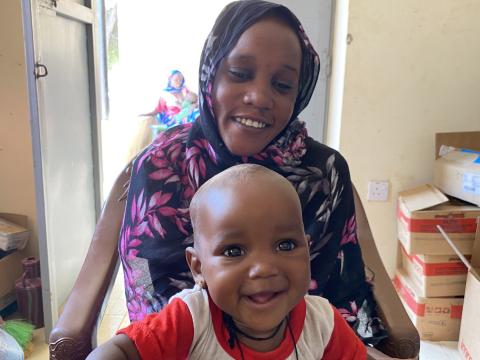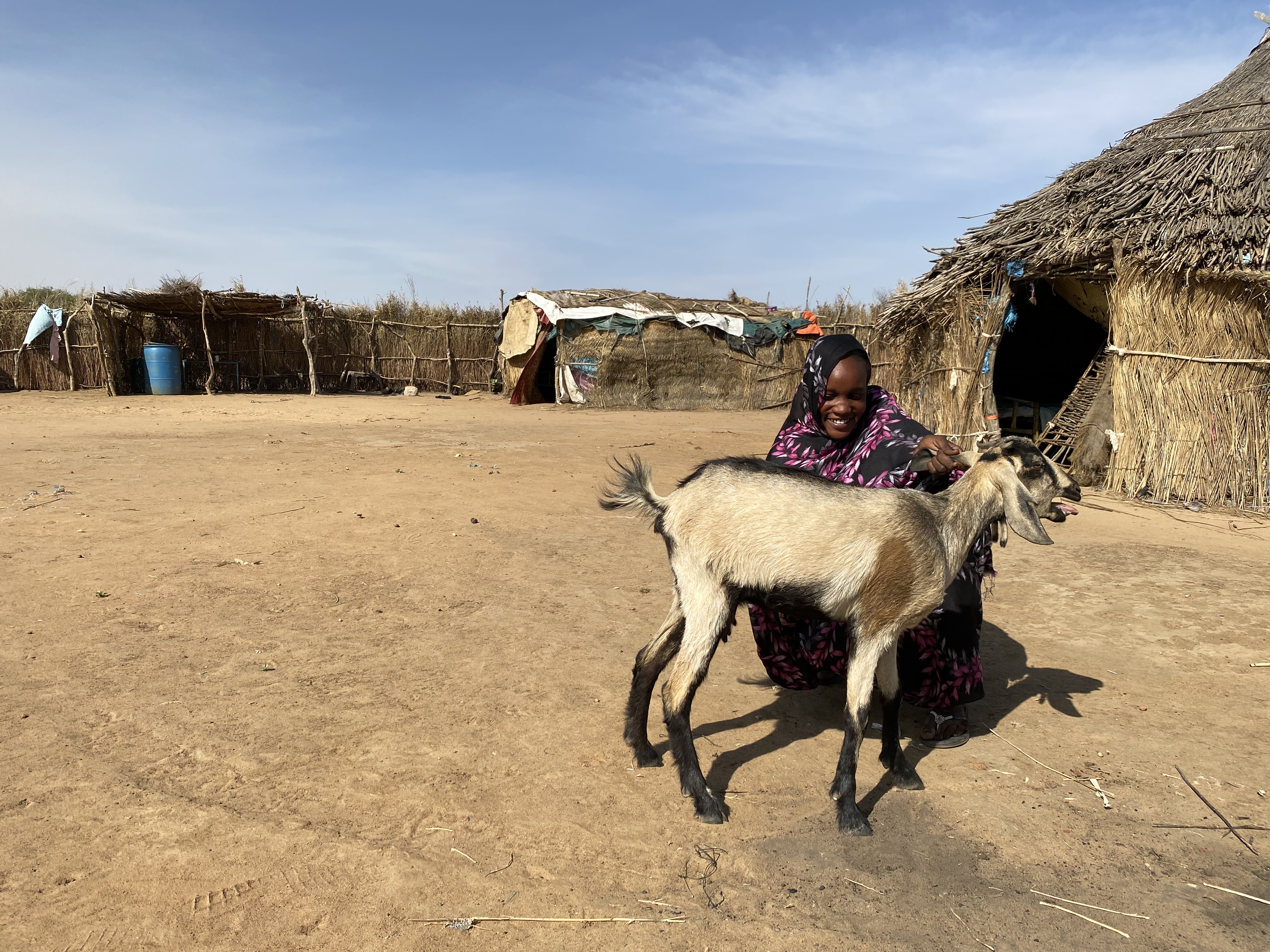Improving access to health and nutrition services for vulnerable populations in East Darfur

Access to proper medical care is one of the major challenges facing people in the remote areas of Sudan's East Darfur region. This is due to the fact that the Darfur regions have been heavily affected for decades by recurrent armed conflict resulting in poor health infrastructure with internally displaced people (IDPs) and refugees straining the available health systems.
GFFO Multi-purpose Cash Transfers to Improve Nutrition
To strengthen the health systems, manage malnutrition and support food-insecure vulnerable people in eight localities in East Darfur, World Vision Sudan received funding from the German Federal Foreign Office (GFFO) in August 2022.
Twenty-year-old Haja is one of the many women who have benefited from the GFFO multi-purpose cash transfer project in East Darfur. Haja visited Abu Matariq Hospital because her eight-month-old daughter, Unab, had diarrhea and a fever.
“When I brought Unab to Abu Matariq, the medical assistant told me she had a bacterial infection. I was given medication to stop the diarrhea and fever and transferred to the new nutrition centre.” said Haja.
At the World Vision supported nutrition centre, Unab was weighed and a Mid-Upper Arm Circumference of 11.2 cm, 1.3 cm below the normal, recorded. Unab was given a nutritional supplement to treat the malnutrition and Haja was given a cash transfer worth 111,000 Sudanese pounds, approximately USD $90, to improve her family’s food security.
Haja used the money to buy a goat to provide Unab higher nutritional meals:
I use the milk from the goat I bought, to supplement the food I give Unab. I am also attending the nutrition training sessions conducted in the hospital which have taught me the importance of feeding baby’s different types of nutritious food during the first two years to ensure they grow up healthy.

The GFFO project has also trained 60 mothers from six different mothers’ groups and six health care facilitators seconded from the ministry of health, on child nutrition to support the treatment of malnutrition in the community.
In one of the supported hospitals, Abu Matariq Hospital, since the project started World Vision has:
- Worked with the East Darfur State Ministry of Health to second 15 medical staff to the hospital
- Provided cash transfers to 200 people to support the improved nutrition of children under five-years-old
- Equipped the hospital with a nutrition unit to test and treat malnutrition cases
- Implemented vaccination campaigns targeting new-born children and pregnant women, and
- Provided cash transfers for six people requiring urgent care to be transferred to the main hospital in the capital city of Daein.
BHA Antenatal Care Support
In Asalaya locality, residents of Al-Munjar village had to travel 13 kilometers to Daean or Nyala to access medical care.
With support from USAID’s Bureau for Humanitarian Assistance (BHA), in August 2022 World Vision Sudan started implementing a health and nutrition project in six localities in East Darfur to improve access to quality health and nutrition services.
To achieve the project’s goal of improving access to health care, World Vision rehabilitated the Al-Munjar health facility in Asalaya which had been out of service since 2017. The rehabilitation included equipping the health facility with a water supply system, constructing a latrine, providing medical equipment such as hospital beds and pharmaceutical supplies.
Working with the East Darfur State Ministry of Health, World Vision also seconded 16 medical staff to support the health facility.
According to Nora Mohammed, a midwife seconded from the ministry of health, on average, five pregnant women are seen at the facility daily.
“We provide antenatal care services ranging from routine follow up, provision of supplements and vaccinations, to facilitating deliveries at the facility,” comments Nora.
Previously, giving birth at home was common due to the lack of medical facilities. However, with the Al-Munjar medical facility providing antenatal services, more women are delivering under the supervision of a medical team. The facility has recorded 19 deliveries since August 2022.
The health facility also works with community midwives to conduct post-natal visits to new mothers.
Our work is not restricted to providing medical care to mothers only during pregnancy,” Nora comments, “We also follow up on the condition of the mother and her baby after delivery.
Midwives conduct bi-weekly home visits to new mothers during the first month of delivery to ensure the mother and her baby are healthy. The visits include checking the baby’s weight, ensuring the baby is vaccinated and checking if the mother is experiencing any after-delivery side effects such as bleeding and referring them to the health facility.
The facility also provides pregnant women measles, rubella, varicella, meningococcal, polio, typhoid and cholera vaccines. During a routine visit to the Al Munjar health facility, the World Vision team met 20-year-old Khadija who is nine months pregnant as she received her last vaccine dose.
“This will be my first baby and coming for the ante-natal clinics has reduced my worries about delivery,” she says.
According to Aisha al Sharif, a vaccination technician at the health facility, 29 mothers and 125 children have been vaccinated since August 2022.
As part of the nutrition aspect of the project, children are screened and treated for moderate acute malnutrition. Since the project start, 98 children under five-years-old have been screened with 54 who were malnourished fully treated, according to Abdullah Adam, a ministry of health medical staff.
The project has also supported the formation of 30 mothers’ groups, with 10 mothers per group, to create awareness on child health and nutrition in the community. A health committee of 15 members (eight males and seven females) is responsible for coordinating the awareness sessions provided in the mothers’ groups as well as supporting the medical team seconded from the ministry of health by facilitating their accommodation in the area.
- Story by Gamal Ghalab, World Vision Sudan Communications Officer.